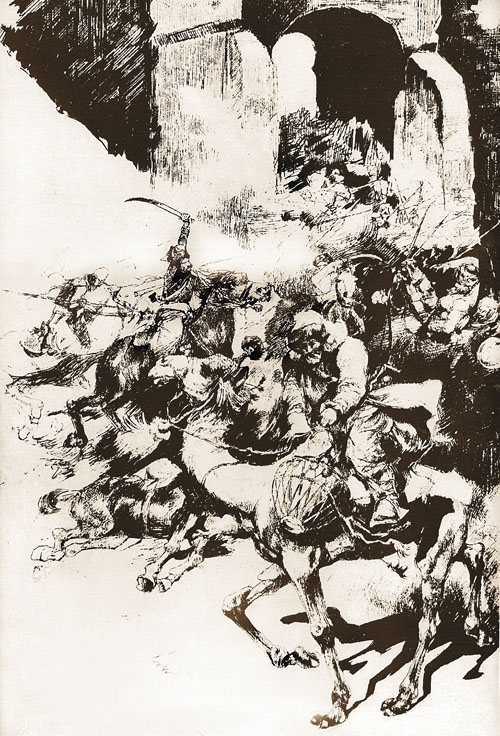A nation that is emerging in the fight
The Day of Unity of Ukraine: victories, tragedies, and the price of unity
It happens often that some holiday, some significant date, which seemed to some people just “a tribute to ritual,” a frozen tradition, perhaps even an archaic relic, suddenly becomes a living force, inspiring people and ascending spiritual high ground, calling on people to do heroic deeds, even unto death. The Day of Unity of Ukraine, celebrated on January 22, which has recently become an official celebration, is a convincing example of the phenomenon just described. The former Unification Day, which had not been made official even two decades after independence, and had, frankly speaking, less than complete support around Ukraine, has been renamed the Unity Day and become a nation-building, or even nation-consolidating symbol. Why has it? Because the ideals of national consolidation and nationwide unity from the Carpathians to the Donetsk steppes that underlay it have been paid for with blood. People fight for them, achieve them through terrible sacrifices, and they do it now just as our ancestors did in January 1919, when the Ukrainian People’s Republic and the Western Ukrainian People’s Republic united. This is the meaning of the Unity Day for Ukrainians in January of the year 2015.
To make a truly indivisible, sovereign, European, socially just Ukraine happen, we feel it is far more important, instead of retelling once again the events of 1919 and views and actions of Mykhailo Hrushevsky, Symon Petliura, Volodymyr Vynnychenko, and Yevhen Petrushevych, reflect on the question which is seemingly easy, but crucial for us: “What actually unites the nation?” (The brutal, destructive war in the Donbas and the terrible trial of the Russian aggression virtually force us to think about it!) Of course, there can be no one answer here, but we should still try to reflect on it together.
Why has the tragedy occurred in eastern Ukraine? Undoubtedly, it has been subversive, despicable work of the “special operations” experts from Russia (ideologists likely dominated this effort) that has created the necessary conditions for a large-scale bloodshed in Donetsk and Luhansk regions. Our enemies have done and will do everything in their power to keep this war consuming ever more lives and devouring ever more of our territory (with the tacit connivance of certain European officials who, contrary to our previous naive notions, sometimes fail to show true commitment to solidarity with Ukraine in these tragic months and lack ability to understand and hear the other). This is true. However, if we do not want to act like an ostrich, which buries its head in the sand to escape the “inconvenient” facts, we have to admit that no less important reason for the Ukrainian tragedy of 2014 has been an internal decay, political and moral weakness, general rottenness of the state and the system which we have inherited from the Ukrainian SSR. Despite 23 years of demagogic chatter about “reform,” this system has never seen a real reform, for the “elite” was not going to do it, being content with the state and the system as they were and knowing that substantially reforming the rusty structure that had long outlived its time would be contrary to the own interests of the “elite.” This state enjoyed no trust of its citizenry (in the east as well as in the west, in the center as well in the south of the country), because it constantly lied through the mouths of its senior officials, cynically disrespected dignity, safety, health and the very lives of its citizens. The Revolution of Dignity will gain its final victory only when the inner essence of that state will be systematically and irreversibly changed.
Another thing is that people’s aversion to arrogant ruling feudal clans that somehow believed that their positions were unassailable (they were especially arrogant in the Donbas, where the earlier regime did succeed in creating “a new historical human community, the Soviet people”) – that aversion was masterfully used by Russian provocateurs. However, we must not overlook the harsh facts.
The matter is then: is not eternal, life-affirming human striving for freedom (political, spiritual, national, and freedom of self-fulfillment) the bond that unites all citizens of Ukraine, no matter what language they speak, what God they pray to, where they live? There is every reason to believe that this is the case!
***
And the last point. The problem of Ukraine’s real unity (sobornist), based on common values and ideals, as well as the problem of national identity and choice of the European or “Eurasian” way of civilization, is a striking example of how this accursed “vicious circle” has been holding its grip on the nation for centuries, not just decades. At first glance, there are convincing historical examples that shed light on what caused the evil “historical burden” of our tragedies, conflicts, and failures. Likewise, almost a 400-year time gap is not an obstacle for us to remember that Sahaidachny’s Cossack army in fact saved the entire Europe from the Ottoman Empire’s aggression in the Battle of Khotyn (1621). But does Europe know this? Does it know that our nation has been, by no means once or twice, a shield (at the cost of terrible losses) between the Eastern aggressive authoritarianism – from Batu Khan’s invasion in 1240 to the present day – and Western civilization? The civilization that is still unprepared to recognize Ukraine as its integral part…
But we have a definite choice. Sobornist, i.e., unity in freedom, in respecting the rights of every free human being, in the modernization of society not on the principles of a Byzantine-Tatar “Russian World” but on the principles of the 3rd-millennuim civilization. Which of the Ukrainian citizens will object to this?






